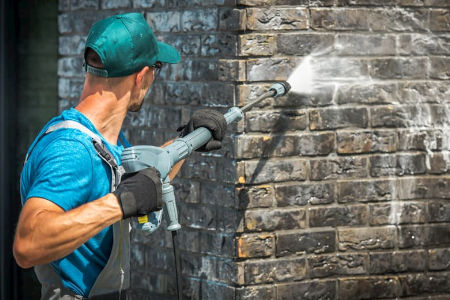
A soft wash and a pressure wash are two different methods used for cleaning surfaces, such as buildings, decks, driveways, or roofs. The main differences between the two lie in the equipment used, the water pressure applied, and the cleaning solutions employed.
- Water Pressure: A soft wash utilizes low-pressure water, typically around 100-500 pounds per square inch (PSI). This gentle approach prevents damage to delicate surfaces and ensures a thorough cleaning. Conversely, a pressure wash employs high-pressure water, usually ranging from 1,500 to 4,000 PSI, which is more suitable for removing stubborn grime, dirt, or surface stains.
- Equipment: For a soft wash, specialized equipment, such as a soft wash system or a low-pressure sprayer, is used. This equipment allows for the controlled application of water and cleaning solutions. On the other hand, a pressure wash requires a pressure washer machine that can generate the required high-pressure water stream.
- Cleaning Solutions: Soft washing often involves the use of biodegradable cleaning solutions specifically formulated to kill mold, mildew, algae, and other organic contaminants. These solutions are applied to the surface before gently rinsing them away with low-pressure water. In contrast, pressure washing typically relies on water pressure alone to remove dirt, grime, and loose debris. However, specialized detergents or cleaning agents may be used for particularly tough stains during pressure washing.
- Surface Applications: Soft washing is generally used for cleaning more delicate surfaces, such as roofs, painted or stained wood, vinyl siding, or stucco. The low-pressure water and gentle cleaning solutions minimize the risk of damage during the cleaning process. Pressure washing, with its higher water pressure, is typically suitable for tougher surfaces like concrete, brick, stone, or metal.
It's important to note that both soft washing and pressure washing can be effective methods for cleaning surfaces. The choice of which method to use depends on the specific cleaning requirements, the surface type, and the level of grime or stains to be cleaned. It's generally recommended to hire professionals who are experienced in using these techniques to ensure the best results while avoiding potential damage.
